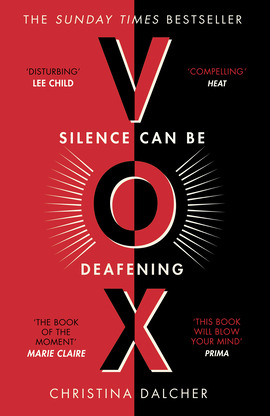Text






Writing Mood Board
My inspiration to continue writing my novel.
I've been stuck on the first chapter for ages and hope to finish it and publish it someday.
0 notes
Photo


Why Vox by Christina Dalcher is not a good novel: Review & Analysis
The premise of this novel is incredibly interesting, don’t get me wrong: Vox (2018) is about a dystopian future, in which US American women are only allowed to speak 100 words per day and must wear a bracelet that shocks them if they go over that limit. Women also aren’t allowed to write, read or use sign language. The main character is a genius linguist called Jean who hates every man in her life, including her husband Patrick and her own sons.
The first sentence already tells us three things about this novel: (1) it’s told from a first-person perspective, which means the reader will be aware of the protagonist’s every thought, (2) the oppressive regime in the novel goes by the name of Pure Movement, so it’s probably going to have something to do with religion, and (3) the action takes place in the span of a week, which I feel like it’s a huge spoiler for the fact that I won’t care for any of the characters at the end of the book, since there’s only so much character development that can happen in that time.
If anyone told me I could bring down the President, and the Pure Movement, and that incompetent little shit Morgan LeBron in a week’s time, I wouldn’t believe them.
There will be spoilers from this point on.
The Setting and the Protagonist
The main character in Vox, Dr. Jean McClellan, is a specialist researcher in the field of aphasia, that is, according to Wikipedia, “an inability to comprehend or formulate language because of damage to specific brain regions”. At some point in the novel we are made aware that a colleague of Jean’s, with her help, has discovered a cure for aphasia, even though they are both linguists and neither a chemist nor a medical researcher. However, she was unable to publish this discovery, due to the conveniently timed sexist apocalypse that stripped her of all her academic titles, as the reader is often reminded.
Jean is married to her husband Patrick and has four children with him: three boys and a girl. Jean evidently resents every man in her family, especially Patrick and their 17-year-old son, Steven. Apparently they’ve all been very quickly indoctrinated to believe women shouldn’t be allowed to speak, so they treat Jean and Sonia, the daughter, accordingly.
There is a whole subplot about Steven, but it’s so plain and uninteresting that there isn’t much to say about it. Basically, he is all for the Pure Movement and their ideals of purity for women, but then still sleeps with his high school girlfriend and proceeds to tattle on her. When she is taken away to a camp, he realizes his mistake a leaves to save her. At some point he is captured by the Movement and ridiculed on TV. Jean doesn’t really care that he’s gone, but is pleasantly surprised when he reappears at the end safe and sound.
At this point, the Pure Movement has only been in power for less than a year and a half. This movement is very overtly described as a Christian uprising that originated within the bible belt and had spread to the entirety of the USA. The followers of the Movement also adopt overly conservative views on gender roles, marriage and sex, leaving very little doubt about the roots of the oppressive regime in Vox.
The Plot
The main intrigue in Vox begins when the brother of the US president starts suffering from aphasia after a “skiing accident” and the government comes to Jean for help, despite her being a woman in a society that literally won’t let women speak. Why do they come to her instead of going to any other male scientist? Because apparently Jean is the best linguist in the whole country... even though, as far as the government (and the reader) knows, she’s only been researching aphasia for a couple of years and hasn’t found a cure yet. Well, the author herself has a doctorate in linguistics (not in the field of aphasia), which brings me to my first problem with this novel: the blatant and, quite frankly conceited, self-insert.
You may have noticed that I wrote “skiing accident” in quotation marks on the last paragraph. That’s because it’s hinted a couple of times throughout the novel that the president’s brother was actually injured on purpose by the government, but this turns out to be false. Later it seems like he was never even injured in the first place, but this is never clearly resolved, as the character himself never appears “onscreen”; however, it’s not a cliffhanger that perpetually haunts the reader.
Back to the story: Jean agrees to help because, by taking the job, she and her daughter get to remove the shock bracelets for the duration of the research. The government then proceeds to give Jean one week (remember the novel’s first sentence) to produce a cure that, to the best of their knowledge, hasn’t even been found yet. If that sounds like a stretch, they even let her work with her old research team of three people, which is supposed to fully convince the reader that a week is a completely plausible time frame to discover, produce, test and approve a cure for an illness.
The Side Characters
This team is composed of Jean, her former colleagues Lin and Lorenzo, and their supervisor Morgan, who you might remember from the novel’s opening sentence. Morgan is apparently an idiot linguist who is very unfit for his position, which is supposed to show how twisted the society in Vox is, as they put the dumb people in charge just because they’re men, and silence the smart women. What it actually does is show that this version of the USA apparently only has a handful of linguists and no other skilled scientists.
This is the novel’s description of Lin:
Lin Kwan is a small woman. I often told Patrick she could fit in one of my pant legs – and I’m only five and a half feet and 120 soaking wet, thanks to the stress diet I’ve been on for the past several months. Everything about her is small: her voice, her almond eyes, the sleek bob that barely reaches below her ears. Lin’s breasts and ass make me look like a Peter Paul Rubens model. But her brain – her brain is a leviathan of gray matter. It would have to be; MIT doesn’t hand out dual PhDs for nothing.
Here we learn that Lin is small, not conventionally attractive (read: small boobs and ass), and finally that she is incredibly intelligent. For some reason, Jean finds it important to describe Lin’s curves, as well as her own, before mentioning Lin’s intelligence. No, this novel was not written by Michael Bay. Also, for representation’s sake, Lin is Asian and a lesbian, yet every other major character in this novel is a white straight person.
Well, there is another lesbian in this story, actually. Jean’s old college roommate, Jackie Juarez, who Jean hasn’t seen since before the machocalypse. We get to know Jackie through flashbacks: the novel tries to portray her as this loud, over-the-top feminist who often tries to make Jean join the rallies and protests against the growing Pure Movement. Alas, Jean chooses to focus on school instead of going to protests and forever regrets this, thinking that if only she had fought, she might have changed history.
I don’t know how to feel about this novel’s depiction of Jackie. She is made out to be a stereotypical feminist lesbian, who actively protests against the uprising of the Pure Movement, and yet whose efforts are in vain. Here is an excerpt that characterizes how Jean sees Jackie, and therefore how the reader is supposed to see her:
“You have to vote, Jean,” [Jackie] said, throwing down the stack of campaign leaflets she’d been running around campus with while I was prepping for what I knew would be a monster of an oral exam. “You have to.”
“The only things I have to do are pay taxes and die,” I said, not holding back the sneer in my voice. That semester was the beginning of the end for Jackie an me. I’d started dating Patrick and preferred our nightly discussions about cognitive processes to Jackie’s rants about whatever new thing she had found to protest.
Here you can see that Jean clearly dismisses Jackie and “whatever new thing she had found to protest”, and instead muses about what an intellectual she is. I understand that this is a flashback, and it’s supposed to show that Jean was wrong not to care about protesting the Pure Movement, but this is told from present Jean’s perspective, so it’s clear she still rolls her eyes at Jackie’s activism in general. It feels like Vox is trying to say that actively expressing your ideas and concerns is useless, since Jean eventually overthrows the government with science and not through activism – and it even takes her no longer than a week to do it, as we learn at the beginning of this novel. There is a lot to unpack here, but I still wouldn’t recommend thinking too hard about the ideas in this book.
Jackie only becomes relevant to the plot towards the end. At some point she is held hostage by the government, so that Jean is forced to finish her work. Why the government chose to kidnap Jean’s old college roommate who she hasn’t seen or spoken about in years instead of, say, her daughter, we will never know. In the end, Jackie is only there so that Jean can save her and “redeem” herself for not having been there for Jackie in the past.
Lorenzo, the last member of the team, is Jean’s love affair since way before the Pure Movement effectively took over. The novel likes to remind the reader that Jean is with the Italian hunk Lorenzo because she despises her husband Patrick, so that makes cheating okay. Eventually we learn that Jean is pregnant with Lorenzo’s child, so he offers to let her escape with him to Italy as his wife. Yet Jean can’t allow herself to leave without her daughter Sonia – she’s fine with never seeing any of her sons again, though. She considers this for a while as she works on the cure for aphasia.
The Ending
At some point during the week, Lin disappears (we later learn she was imprisoned due to big gay activity). Jean and Lorenzo announce that they’ve discovered the cure and even test the serum on a random neighbour of Jean’s who happens to have aphasia as well. Also, Jean’s mother had an aneurysm earlier that week and also started suffering from aphasia. The government is pleased with the results and take the serum away.
Later, Morgan, the supervisor, takes Jean and Lorenzo to a strange lab underground to have them further develop the cure. There they walk through a hallway full of chimpanzees in cages, and there is a bizarre scene in which Jean gets too close to a cage and is attacked by a chimpanzee. There is no purpose to this scene other than to shock the reader, honestly. Here, the novel briefly, yet disrespectfully brings up a very real woman who was mauled by a chimpanzee in 2009 and managed to survive (Wikipedia link, no pictures), by having Jean think something along the lines of “oh no, I don’t want to end up like her!” during the attack.
Jean is fine, obviously. We’re over 200 pages in and nearing the end of the novel when the first interesting development happens in the form of a plot twist: the government has been using their cure in order to create an anti-serum that gives people aphasia. Their plan is to create a more effective means to silence women, of course, since they wouldn’t be able to comprehend or formulate language any more. When Jean discovers this, she wants to quit, but is forced to stay when they reveal they’ve been keeping Jackie, Lin and Lin’s girlfriend hostage in the same building for this very occasion. And maybe also Steven back at that camp, but we don’t even care about him at this point.
The climax of the story arrives, and everything happens so quickly the reader doesn’t have time to digest it. I had to reread what actually happened at the end, because I couldn’t remeber it anymore. I’ll try to recreate the pacing of the ending in the following paragraph, so you can understand what I mean:
Jean and Lorenzo save the lesbians (who are the only likeable characters, so that made me happy), Morgan dies, I think, and they escape with the anti-serum. Patrick appears and decides to help, so they send him to the White House with an anti-serum bomb that suceeds, giving the president and all evil politicians aphasia. Patrick is killed during this, freeing Jean from their marriage and allowing her to escape with Lorenzo and all of her children, whom she suddenly stopped resenting. The Pure Movement collapses and all is well, thanks to... well, thanks to Patrick and Lorenzo.
Conclusion
Vox is a mess of a novel. The characters are unlikeable, the plot is badly paced and the ending is too sudden. I really didn’t care about what happened to any character at any point, which is incredibly disappointing. Additionally, there are many things wrong with the political message in Vox, namely the idea that all religious people are inherently evil and that men generally wish to control and silence women. The premise was good, the writing was fine, but the performance was terrible, unfortunately. Vox feels like it was rushed to come out in time for the dystopian fiction craze of 2017-18 caused by the release of The Handmaid’s Tale TV series. Hopefully we’ll see better work from the author in the future.
Blog | Goodreads
#book review#booklr#bookblr#bookish#reading#bibliophile#booklover#litblr#reader#book#books#review#library#feminism#anti feminism#radfem#sexism#vox#dystopian#dystopia#christina dalcher#vox spoilers#tw: death#tw: animal attack
7 notes
·
View notes